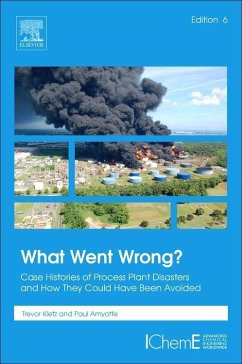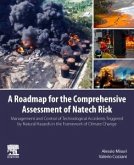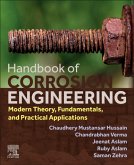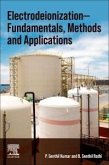Trevor Kletz (UK Process Safety Consultant), Paul Amyotte (Dalhousie UniversityCanada)
What Went Wrong?
Case Histories of Process Plant Disasters and How They Could Have Been Avoided
Trevor Kletz (UK Process Safety Consultant), Paul Amyotte (Dalhousie UniversityCanada)
What Went Wrong?
Case Histories of Process Plant Disasters and How They Could Have Been Avoided
- Gebundenes Buch
- Merkliste
- Auf die Merkliste
- Bewerten Bewerten
- Teilen
- Produkt teilen
- Produkterinnerung
- Produkterinnerung
Contains 20% new material and an update of existing content, with parts A and B now combined Includes case studies that incorporate Safety Instrumented Systems terminology and information Presents biological hazard case histories and examples of recent incidents
Andere Kunden interessierten sich auch für
![What Went Wrong? What Went Wrong?]() Bernard LewisWhat Went Wrong?13,99 €
Bernard LewisWhat Went Wrong?13,99 €![The French Revolution and What Went Wrong The French Revolution and What Went Wrong]() Stephen ClarkeThe French Revolution and What Went Wrong15,99 €
Stephen ClarkeThe French Revolution and What Went Wrong15,99 €![What Really Went Wrong What Really Went Wrong]() Fawaz A. GergesWhat Really Went Wrong25,99 €
Fawaz A. GergesWhat Really Went Wrong25,99 €![What Went Wrong What Went Wrong]() Graham DeightonWhat Went Wrong28,99 €
Graham DeightonWhat Went Wrong28,99 €![A Roadmap for the Comprehensive Assessment of Natech Risk A Roadmap for the Comprehensive Assessment of Natech Risk]() Alessio Misuri (University of Bologna, Bologna, Italy)A Roadmap for the Comprehensive Assessment of Natech Risk206,99 €
Alessio Misuri (University of Bologna, Bologna, Italy)A Roadmap for the Comprehensive Assessment of Natech Risk206,99 €![Handbook of Corrosion Engineering Handbook of Corrosion Engineering]() Chandrabhan Verma (Department of Chemical Researcher and PetroleumHandbook of Corrosion Engineering244,99 €
Chandrabhan Verma (Department of Chemical Researcher and PetroleumHandbook of Corrosion Engineering244,99 €![Electrodeionization Electrodeionization]() P. Senthil Kumar (Centre for Pollution Control Associate ProfessorElectrodeionization244,99 €
P. Senthil Kumar (Centre for Pollution Control Associate ProfessorElectrodeionization244,99 €-
-
-
Contains 20% new material and an update of existing content, with parts A and B now combined Includes case studies that incorporate Safety Instrumented Systems terminology and information Presents biological hazard case histories and examples of recent incidents
Hinweis: Dieser Artikel kann nur an eine deutsche Lieferadresse ausgeliefert werden.
Hinweis: Dieser Artikel kann nur an eine deutsche Lieferadresse ausgeliefert werden.
Produktdetails
- Produktdetails
- Verlag: Elsevier - Health Sciences Division
- 6 ed
- Seitenzahl: 840
- Erscheinungstermin: 27. Juni 2019
- Englisch
- Abmessung: 237mm x 162mm x 49mm
- Gewicht: 1430g
- ISBN-13: 9780128105399
- ISBN-10: 0128105399
- Artikelnr.: 55873780
- Herstellerkennzeichnung
- Libri GmbH
- Europaallee 1
- 36244 Bad Hersfeld
- gpsr@libri.de
- Verlag: Elsevier - Health Sciences Division
- 6 ed
- Seitenzahl: 840
- Erscheinungstermin: 27. Juni 2019
- Englisch
- Abmessung: 237mm x 162mm x 49mm
- Gewicht: 1430g
- ISBN-13: 9780128105399
- ISBN-10: 0128105399
- Artikelnr.: 55873780
- Herstellerkennzeichnung
- Libri GmbH
- Europaallee 1
- 36244 Bad Hersfeld
- gpsr@libri.de
Trevor Kletz, OBE, D.Sc., F.Eng. (1922-2013), was a process safety consultant, and published more than a hundred papers and nine books on loss prevention and process safety, including most recently Lessons From Disaster: How Organizations Have No Memory and Accidents Recur and Computer Control and Human Error. He worked thirty-eight years with Imperial Chemical Industries Ltd., where he served as a production manager and safety adviser in the petrochemical division, also holding membership in the Department of Chemical Engineering at Loughborough University, Leicestershire, England. He most recently served as senior visiting research fellow at Loughborough University, and adjunct professor at the Mary Kay O'Connor Process Safety Center, Texas A&M University.
INTRODUCTION
1. Case Histories and Their Use in Enhancing Process Safety Knowledge
2. Bhopal
3. Opportunities for Reflection
MAINTENANCE AND OPERATIONS
4. Maintenance: Preparation and Performance
5. Operating Methods
6. Entry to Vessels and Other Confined Spaces
7. Accidents Said to Be Due to Human Error
8. Labeling
9. Testing of Trips and Other Protective Systems
10. Opportunities for Reflection
EQUIPMENT AND MATERIALS OF CONSTRUCTION
11. Storage Tanks
12. Stacks
13. Pipes and Vessels
14. Tank Trucks and Tank Cars
15. Other Equipment
16. Materials of Construction
17. Opportunities for Reflection
HAZARDS AND LOSS OF CONTAINMENT
18. Leaks
19. Liquefied Flammable Gases
20. Hazards of Common Materials
21. Static Electricity
22. Reactions - Planned and Unplanned
23. Explosions
24. Opportunities for Reflection
KNOWLEDGE AND COMMUNICATION
26. Poor Communication
27. Accidents in Other Industries
28. Accident Investigation - Missed Opportunities
29. Opportunities for Reflection
DESIGN AND MODIFICATIONS
30. Inherently Safer Design
31. Changing Procedures Instead of Designs
32. Both Design and Operations Could Have Been Better
33. Modifications: Changes to Equipment and Processes
34. Modifications: Changes in Organization
35. Reverse Flow, Other Unforeseen Deviations, and Hazop
36. Control
37. Opportunities for Reflection
CONCLUSION
38. An Accident That May Have Affected the Future of Process Safety
39. An Accident That Did Not Occur
40. Summary of Lessons Learned
APPENDICES
1. Relative Frequencies of Incidents
2. Why Should We Publish Accident Reports?
3. Some Tips for Accident Investigators
4. Recommended Reading
5. Afterthoughts
1. Case Histories and Their Use in Enhancing Process Safety Knowledge
2. Bhopal
3. Opportunities for Reflection
MAINTENANCE AND OPERATIONS
4. Maintenance: Preparation and Performance
5. Operating Methods
6. Entry to Vessels and Other Confined Spaces
7. Accidents Said to Be Due to Human Error
8. Labeling
9. Testing of Trips and Other Protective Systems
10. Opportunities for Reflection
EQUIPMENT AND MATERIALS OF CONSTRUCTION
11. Storage Tanks
12. Stacks
13. Pipes and Vessels
14. Tank Trucks and Tank Cars
15. Other Equipment
16. Materials of Construction
17. Opportunities for Reflection
HAZARDS AND LOSS OF CONTAINMENT
18. Leaks
19. Liquefied Flammable Gases
20. Hazards of Common Materials
21. Static Electricity
22. Reactions - Planned and Unplanned
23. Explosions
24. Opportunities for Reflection
KNOWLEDGE AND COMMUNICATION
26. Poor Communication
27. Accidents in Other Industries
28. Accident Investigation - Missed Opportunities
29. Opportunities for Reflection
DESIGN AND MODIFICATIONS
30. Inherently Safer Design
31. Changing Procedures Instead of Designs
32. Both Design and Operations Could Have Been Better
33. Modifications: Changes to Equipment and Processes
34. Modifications: Changes in Organization
35. Reverse Flow, Other Unforeseen Deviations, and Hazop
36. Control
37. Opportunities for Reflection
CONCLUSION
38. An Accident That May Have Affected the Future of Process Safety
39. An Accident That Did Not Occur
40. Summary of Lessons Learned
APPENDICES
1. Relative Frequencies of Incidents
2. Why Should We Publish Accident Reports?
3. Some Tips for Accident Investigators
4. Recommended Reading
5. Afterthoughts
INTRODUCTION
1. Case Histories and Their Use in Enhancing Process Safety Knowledge
2. Bhopal
3. Opportunities for Reflection
MAINTENANCE AND OPERATIONS
4. Maintenance: Preparation and Performance
5. Operating Methods
6. Entry to Vessels and Other Confined Spaces
7. Accidents Said to Be Due to Human Error
8. Labeling
9. Testing of Trips and Other Protective Systems
10. Opportunities for Reflection
EQUIPMENT AND MATERIALS OF CONSTRUCTION
11. Storage Tanks
12. Stacks
13. Pipes and Vessels
14. Tank Trucks and Tank Cars
15. Other Equipment
16. Materials of Construction
17. Opportunities for Reflection
HAZARDS AND LOSS OF CONTAINMENT
18. Leaks
19. Liquefied Flammable Gases
20. Hazards of Common Materials
21. Static Electricity
22. Reactions - Planned and Unplanned
23. Explosions
24. Opportunities for Reflection
KNOWLEDGE AND COMMUNICATION
26. Poor Communication
27. Accidents in Other Industries
28. Accident Investigation - Missed Opportunities
29. Opportunities for Reflection
DESIGN AND MODIFICATIONS
30. Inherently Safer Design
31. Changing Procedures Instead of Designs
32. Both Design and Operations Could Have Been Better
33. Modifications: Changes to Equipment and Processes
34. Modifications: Changes in Organization
35. Reverse Flow, Other Unforeseen Deviations, and Hazop
36. Control
37. Opportunities for Reflection
CONCLUSION
38. An Accident That May Have Affected the Future of Process Safety
39. An Accident That Did Not Occur
40. Summary of Lessons Learned
APPENDICES
1. Relative Frequencies of Incidents
2. Why Should We Publish Accident Reports?
3. Some Tips for Accident Investigators
4. Recommended Reading
5. Afterthoughts
1. Case Histories and Their Use in Enhancing Process Safety Knowledge
2. Bhopal
3. Opportunities for Reflection
MAINTENANCE AND OPERATIONS
4. Maintenance: Preparation and Performance
5. Operating Methods
6. Entry to Vessels and Other Confined Spaces
7. Accidents Said to Be Due to Human Error
8. Labeling
9. Testing of Trips and Other Protective Systems
10. Opportunities for Reflection
EQUIPMENT AND MATERIALS OF CONSTRUCTION
11. Storage Tanks
12. Stacks
13. Pipes and Vessels
14. Tank Trucks and Tank Cars
15. Other Equipment
16. Materials of Construction
17. Opportunities for Reflection
HAZARDS AND LOSS OF CONTAINMENT
18. Leaks
19. Liquefied Flammable Gases
20. Hazards of Common Materials
21. Static Electricity
22. Reactions - Planned and Unplanned
23. Explosions
24. Opportunities for Reflection
KNOWLEDGE AND COMMUNICATION
26. Poor Communication
27. Accidents in Other Industries
28. Accident Investigation - Missed Opportunities
29. Opportunities for Reflection
DESIGN AND MODIFICATIONS
30. Inherently Safer Design
31. Changing Procedures Instead of Designs
32. Both Design and Operations Could Have Been Better
33. Modifications: Changes to Equipment and Processes
34. Modifications: Changes in Organization
35. Reverse Flow, Other Unforeseen Deviations, and Hazop
36. Control
37. Opportunities for Reflection
CONCLUSION
38. An Accident That May Have Affected the Future of Process Safety
39. An Accident That Did Not Occur
40. Summary of Lessons Learned
APPENDICES
1. Relative Frequencies of Incidents
2. Why Should We Publish Accident Reports?
3. Some Tips for Accident Investigators
4. Recommended Reading
5. Afterthoughts








